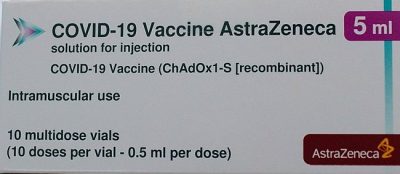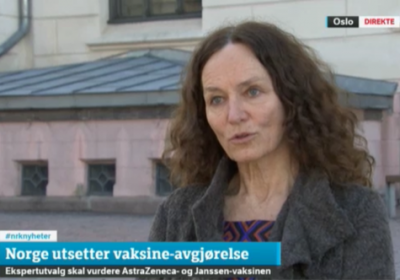NEWS ANALYSIS: Norway’s public health institute FHI wants to remove AstraZeneca from the state vaccination program because of “very many” cases of serious and even fatal side-effects among Norwegians. The government, however, wants to keep the program rolling, in order to reopen Norway as soon as possible. In a rare public display of high-level disagreement, Health Minister Bent Høie did not accept FHI’s recommendation on Thursday to drop AstraZeneca, opting instead to wait for a new evaluation of the vaccine by an “expert group” due on May 10.

Thursday afternoon’s press conference on the fate of AstraZeneca in Norway got off to a chaotic start, apparently because of the disagreement that came as surprise to many. Right after FHI had released its written recommendation against AstraZeneca, state broadcaster NRK flashed a bulletin that “Norway drops AstraZeneca,” only to have to retract that a few minutes later when Høie suddenly said the government had decided to postpone a decision on the use of the vaccine.
“We don’t have a good enough foundation to make a final decision yet,” Høie read from a rather disjointed statement. He said the government would “continue to evaluate” the AstraZeneca vaccine based on data from other countries, not just Norway. When he finished reading the government’s surprise statement and it was FHI leader Dr Camilla Stoltenberg’s turn to speak, her microphone wasn’t working properly. It soon became clear, however, that Stoltenberg and Høie were at odds, live on national TV.
Risk analysis
Stoltenberg made it clear that from a medical standpoint, the public health institute thinks the AstraZeneca vaccine presents too much of a risk, at least in Norway. Three otherwise healthy Norwegians under the age of 55 have suffered cerebral and stomach hemorrhages and died after being vaccinated with it, and several others have fallen seriously ill. “That’s very many,” Stoltenberg told NRK, also from an analytical point of view, and it’s been suspended since March. By comparison, Johnson & Johnson has voluntarily pulled its new vaccine off the market following just one death and a few more non-fatal cases of hemorraghing in the US, even though millions have been injected with it. That means a million doses of the Johnson & Johnson vaccine due to arrive in Norway in June probably won’t arrive, further jeopardizing the pace of the country’s vaccination program.

FHI nonetheless recommends taking the AstraZeneca vaccine out of the Norwegian vaccination program, and both Høie and other government officials had seemed to agree. They had also expressed concerns about AstraZeneca, supported its suspension and were acutely aware that Denmark dropped it from its national program on Wednesday. Høie changed his tone on Thursday, stressing that AstraZeneca remained “an approved vaccine” that shouldn’t be ruled out yet. “We’re simply not saying ‘no’ yet,” he told NRK, while admitting that the looming lack of the Johnson & Johnson vaccine makes it “more difficult” to halt AstraZeneca’s use.
Political issues
The main problem for the government is that if the currently suspended AstraZeneca vaccine is permanently removed from the program, it will mean roughly a seven-week delay in completing vaccinations through the 18-44 age group. Vaccinations of all adults in Norway wouldn’t be completed until September, and if the Johnson & Johnson vaccine fails to show up, the delay can extend into October.
That would have consequences on the government’s plans to re-open Norway and get the country back to some semblance of normality before the September 13 national election. While FHI is most concerned about public health, the government must make political decisions to also preserve the economy, avoid bankruptcies after months of closure and get Norwegians back to work and play. It’s also, of course, concerned about its own future and wants to stay in power.
In some ways, the government can’t win. If it accepts FHI’s recommendation and drops AstraZeneca, it faces criticism from the opposition in Parliament over reopening delays and impatient voters who want the Corona crisis to end. If it rejects FHI’s recommendation, allows use of AstraZeneca and more Norwegians fall ill or die, the government can be accused of failing to follow professional medical advice.

“It’s an extremely difficult decision,” said both Høie and Stoltenberg after the press conference, with Høie still expressing confidence in FHI and Stoltenberg adding that she wasn’t offended that Høie was seeking the proverbial second opinion. Their disagreement at least didn’t appear outwardly hostile. She seemed to downplay the impact of vaccination delays indicated, however, suggesting that delays of just a few weeks for most Norwegians don’t justify the risk of using AstraZeneca. Newspaper VG also reported Thursday afternoon that an FHI study indicates public skepticism towards AstraZeneca. Many may not want to take it if offered.
Meanwhile AstraZeneca remains on suspension with its fate undecided. Now it’s up to the new “expert group” to offer a new recommendation to the government in May.
The best news this week, to which Høie referred on several occasions, is that Norway will be receiving an additional 600,000 doses of the Pfizer vaccine in June. That will help keep the vaccination program rolling, not least because FHI endorses both the Pfizer and Moderna vaccines. Høie was also proud that at some point on Friday, 1 million Covid-19 vaccinations will be registered in Norway, equivalent to more than 20 percent of the adult population.
NewsInEnglish.no/Nina Berglund

